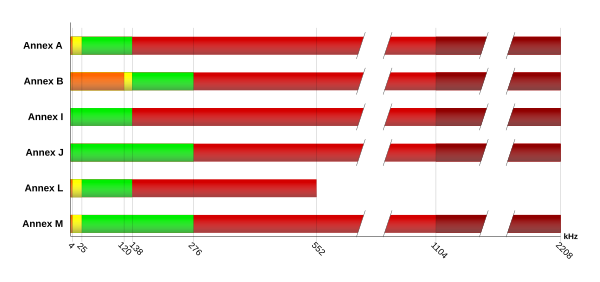G.992.3 Annex J
Appearance
| Status | In force |
|---|---|
| Organization | ITU-T |
| Base standards | G.992.3 |
| Domain | telecommunications |
| License | Freely available |
| Website | https://www.itu.int/rec/T-REC-G.992.3/ |
Annex J is a specification in ITU-T Recommendations G.992.3 and G.992.5 for all digital mode ADSL with improved spectral compatibility with ADSL over ISDN, which means that it is a type of naked DSL which will not disturb existing Annex B ADSL services in the same cable binder.[1][2]
This specification has the same upstream/downstream frequency split of 276 kHz as Annex B, but does not have lower frequency limit of 138 kHz, allowing upstream bandwidth to be increased from 1.8 Mbit/s to 3.5 Mbit/s. This is similar to Annex M, but Annex J can not have POTS on the same line.
Deutsche Telekom started deploying Annex J in 2011, Vodafone Germany followed suit in April 2015 (marketed as quality improvements).

Legend POTS/ISDN Guard Band Upstream Downstream ADSL/ADSL2 Additional Downstream ADSL2+ |
External links
[edit]- ITU-T Recommendation G.992.3: Asymmetric digital subscriber line transceivers 2 (ADSL2)
- ITU-T Recommendation G.992.5: Asymmetric Digital SubscriberLine (ADSL) transceivers - Extended bandwidth ADSL2 (ADSL2+)
References
[edit]- ^ "G.992.3: Asymmetric digital subscriber line transceivers 2 (ADSL2)". www.itu.int. Archived from the original on 2021-06-14. Retrieved 2021-06-14.
- ^ "G.992.5: Asymmetric digital subscriber line 2 transceivers (ADSL2)- Extended bandwidth ADSL2 (ADSL2plus)". www.itu.int. Archived from the original on 2021-06-13. Retrieved 2021-06-14.
